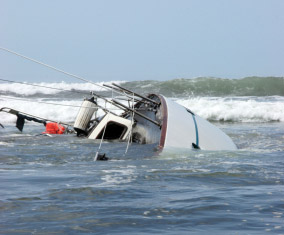
If you own a boat, you need to insure it.
In order to find the best boat insurance policy you need to determine the type of boat you own and what you plan on using it for. Cost will vary according to the age and type of boat.
Insurance for your boat is similar to that for your car. There is not only cover for the boat, but also for passengers, damage to other boats and damage to property.
Policy types
- Third Party Liability covers boat owners for any damage they are not liable for, such as other vessels or property. It will also cover injuries to others including loss of life.
- Comprehensive Cover usually covers all accidental damage, fire, theft and vandalism but is subject to policy conditions.
- New-for-Old Cover means that any item damaged will be replaced with a new one. However, it's likely that there will be an age limit clause where the broker will instead pay out the market value of the item.
- Racing Risks Cover is for those wishing to enter their boat in races. In competitions, boats travelling at higher speeds means a greater risk of damage.
- Laid Up Period refers to the policies where it is established that a vessel is laid up ashore at certain times of the year.
Homeowner's policy
It's possible to have a boat insured under your home insurance policy, but this will rarely cover specific risks such as running aground or wreck removal.
Commercial cover
If you intend to use the boat for commercial purposes, for charter or even informal client entertainment, most insurance companies will class this as commercial use and the cover will probably be more expensive. Always check with your broker to make sure that you are covered.
Going abroad
It is important to check the territorial limits of any boat cover before undertaking a trip abroad. Many European countries will ask for evidence of insurance cover and may require a translation which your insurer should be able to provide.
Which insurance company to choose
You should always choose a familiar and reputable insurance company which specifically caters for boat insurance. Many regular high street insurers are able to offer boat insurance, but may not have the expertise to offer the best advice. If you're in the UK, it is always best to choose a firm based in the UK so that access to UK Law and competition is available if a problem should occur.
Making a Claim
Submit your claim as soon as possible after an accident. Any incidences of theft or criminal damage should be reported to the police. Remember that you'll need the Crime Reference Number for the claim form.
You will be required to provide at least one estimate for the repairs or a written quote for the replacement items if a repair is not possible. Your insurance company may ask to inspect any equipment damaged, before authorising its replacement or send a Loss Adjuster or Surveyor to assess the damage.
Surveys
Most insurance companies will require a survey for any boat aged 20 years old or more, and again after every five years. Some boats may require a survey earlier than this if they have sustained serious damage, if they are wooden or if they have been self-built.
Legal protection
For an additional premium, some insurance policies can be extended to include legal representation if your boat is involved in accident resulting in you suffering financial loss or injury.
None of us can predict when or where an accident may occur. However careful or experienced you may be it's vital to insure your boat. Speak to fellow sailors and do plenty of research on the web. The peace of mind which comes with the right boat insurance is invaluable.